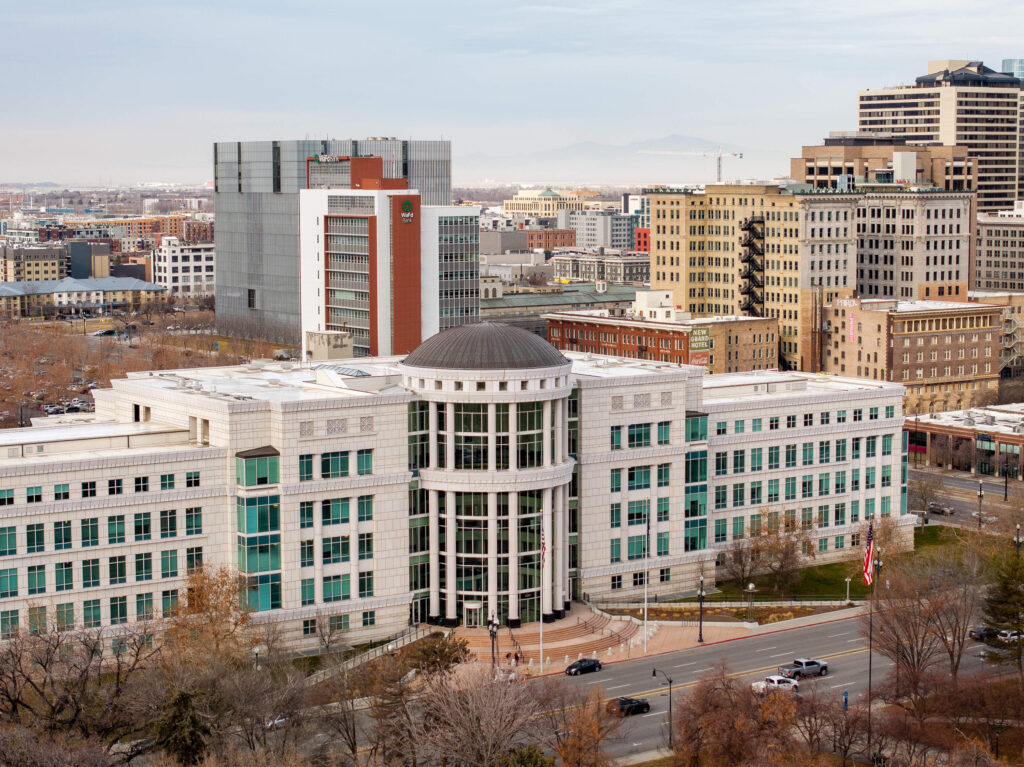Utah News Dispatch
Judge considering whether SLC allows homeless ‘nuisances’ by not enforcing anti-camping laws

A judge on Thursday heard arguments in a lawsuit that nine residents and business owners have filed against Salt Lake City, alleging city officials have not adequately enforced anti-camping laws against homeless individuals and have therefore allowed public and private nuisances to persist across the city for years. City attorneys urged 3rd District Court Judge […]
The post Judge considering whether SLC allows homeless ‘nuisances’ by not enforcing anti-camping laws appeared first on Utah News Dispatch.
The Matheson Courthouse in Salt Lake City is pictured on Wednesday, Jan. 3, 2024. (Photo by Spenser Heaps for Utah News Dispatch)
A judge on Thursday heard arguments in a lawsuit that nine residents and business owners have filed against Salt Lake City, alleging city officials have not adequately enforced anti-camping laws against homeless individuals and have therefore allowed public and private nuisances to persist across the city for years.
City attorneys urged 3rd District Court Judge Andrew Stone to dismiss the case, arguing the complaint is too broad and lacks specifics while ignoring the city’s “enormous efforts and the realities” government faces when it comes to homelessness.
The judge didn’t make a decision on whether to dismiss the case but took it under advisement. He said he hopes to issue a written decision at some point before a preliminary injunction hearing scheduled May 6.
Thursday’s hearing comes after the lawsuit was initially filed in September, about a month before Election Day to determine the winner of Salt Lake City’s heated mayoral race. One of the lawsuit’s plaintiffs is a former mayoral candidate, entrepreneur David Ibarra, who was also a supporter of one of Salt Lake City Mayor Erin Mendenhall’s challengers, former Mayor Rocky Anderson.
Mendenhall handily won reelection, but homelessness, on-street camping and crime was a key issue throughout the heated race.
The complaint
Attorneys for the nine residents that filed the complaint asked the judge to find the city’s actions have “created a public nuisance” by “allowing homeless encampments to proliferate in violation” of city and state laws. They’re also requesting the judge issue a preliminary and permanent injunction that would direct the city to immediately “take all steps necessary to abate the nuisance.”
Ilan Wurman, an attorney with Tully Bailey, the law firm that’s representing the residents and businesses, urged the judge to think about the case in the “proper frame.”
“This is a nuisance case,” he argued, and the judge should consider the city as a “landowner” that’s allowed a nuisance to persist. If the city were a “private landowner,” he argued, “they would never get away with what the city is doing here.”
Wurman’s clients have accused the city of allowing tents, public urination and defecation, public drug use, and generally allowing “conditions” in which crimes and public nuisance can persist.
“Although this is a nuisance case, it is also a plea for sanity and common sense, and a plea to address the humanitarian crisis that the city’s intentional actions (and inactions) have caused and continue to cause,” the complaint states.

The downtown Salt Lake City skyline is backdropped by fresh snow on the Wasatch Mountains on Monday, January 15, 2024. (Photo by Spenser Heaps for Utah News Dispatch)
The group of nine residents and business owners — who own property in Salt Lake City’s downtown, Central City, and Ballpark neighborhoods — have accused Salt Lake City of adopting a policy for “several years now” of “inviting and fostering vagrancy, public camping, public urination, public defecation, and the public use of illegal drugs (including fentanyl and heroin) on its property, to the detriment of several neighborhoods and businesses.”
The complaint includes photographs of tents, blankets and trash spilling onto public sidewalks, as well as photos of human feces and urine on or near the residents’ properties or businesses.
Wurman argued the case isn’t about the “prevention” of illegal behavior, but rather “it’s about the toleration, the allowing of ongoing behavior” that the city has been aware of for weeks, months or years without taking “reasonable steps” to remedy it.
“We’re not suing the city because of the crimes,” he said. “We’re suing them because of the conditions” that he argued leads to criminal behavior.
Should Salt Lake City be treated like a private property owner?
Katie Nichols, an attorney representing Salt Lake City, said the group of residents suing the city have “gone to great lengths to argue that the city is no different than any private property owner … and that’s just not the case.” She argued the city is “different than other private property owners because it has property abutting almost every other private property” in the city.
Nichols noted there are no allegations listed in the complaint “that a tent exists” somewhere specific “and the city won’t do anything about it.”
“There’s no allegation in the complaint that there is a six block radius” where the city is “dropping people off and leaving them and refusing to engage,” she said.
So, if a judge does what the plaintiffs are asking and orders the city to “remedy the conditions, I’m not even sure what I would tell my client” to do, Nichols said, since the residents who brought the lawsuit aren’t asking for a specific location to be cleaned up. She said “all the city could do” is then post an officer at each of the plaintiffs’ properties to prevent camping.
“That’s really the difficulty with trying to shoehorn what is, at face, a disagreement over municipal policy into a law of nuisance,” she said.
What does Salt Lake City do about homeless camps?
Mendenhall has said that the city does indeed enforce its no-camping ordinances, but citations are a “last resort” for people who refuse to move their belongings, The Salt Lake Tribune reported. Issuing citations could compound legal difficulties for unsheltered people and add to obstacles preventing them from obtaining housing.
The city’s Homeless Engagement and Response Team (HEART), responds to reports of camping by trying to offer services to help people experiencing homelessness. Residents and businesses are encouraged to report concerns about camping on the city’s SLC Mobile and MySLC apps, but are urged to report criminal activity to police.
Nichols said there is “no dispute” that it’s “beyond unfortunate” that homelessness and on-street camping happens in Salt Lake City. “But what we’re talking about here is elevating the individual choices of nine folks and making their properties the priority for the entire Salt Lake City police department.”
In a motion to dismiss the case filed Nov. 2, city attorneys argued the residents are requesting “extraordinary and unprecedented action” by asking a judge to “remove high-level policy decisions from duly elected public officials and policy experts,” and as a result elevate the property owners as “arbiters” of city policy and resources.

People experiencing homelessness camp outside the Main Library in Salt Lake City on Jan. 5, 2024. (Photo by Spenser Heaps for Utah News Dispatch)
“There can be no doubt that homelessness is a crisis engulfing a majority of Western states. Its causes are hotly debated, but it is beyond dispute that the issues are complex and multi-faceted,” the city argued in its motion to dismiss, noting Utah like many other states faces a “drastic lack of affordable housing,” even as the Salt Lake Valley’s population continues to grow.
Meanwhile, unsheltered people have also suffered disproportionately high rates of mental illness and substance abuse, “without nearly enough available resources,” attorneys wrote.
For years, Salt Lake City officials have “engaged with its partners” on state, county and community levels “to address these persistent and systemic issues,” Nichols wrote. She argued the plaintiffs haven’t acknowledged “these exceptionally complicated issues” while alleging Salt Lake City’s homeless population “constitute a legal nuisance.”
“Incredibly, plaintiffs assert Salt Lake City is responsible for this alleged nuisance and has intentionally and unreasonably caused it,” she wrote. “Plaintiffs see the unsheltered community not as individuals, but as an aggregate nuisance to be gotten rid of.”
What the group of nine residents want, Nichols wrote, is a “drastic expansion of nuisance law, requesting a court order to compel a municipality to prevent every unlawful act committed by a third party anywhere on a public right-of-way.”
“That is the stuff of science fiction movies,” Nichols wrote, “not reality.”
Utah attorney general, groups representing homeless individuals join case
Ahead of the May 6 preliminary injunction hearing, the judge has allowed both the Utah Attorney General’s Office and a group including the American Civil Liberties Union of Utah to file amicus briefs in the case.
The ACLU of Utah — along with the American Civil Liberties Union Foundation, the National Homelessness Law Center, Crossroads Urban Center, and the Salt Lake Legal Defender Association argued against the lawsuit on behalf of people experiencing homelessness in a brief filed in November.
Forcing the city to up its enforcement through an injunction would likely “exacerbate the problem of homelessness” by seizing and destroying tents and other property while “fining and imprisoning” unhoused people, the brief stated. “Someone who has nowhere safe to stay does not suddenly find housing after being fined hundreds of dollars.”
The ACLU of Utah also argued the injunction would “likely — if not certainly” be unconstitutional by “dismantling campsites that unhoused people rely on to survive, forcibly relocating people experiencing homelessness to unknown and undetermined locations, and ramping up the enforcement of overbroad laws that have already been used … to violate unhoused people’s rights.”
The Utah Attorney General’s Office, however, argued against the ACLU of Utah’s claims, calling them “purely speculative.”
“There are plenty of actions the city could take that would fall well short of deliberately or willfully causing homeless individual’s harm,” the attorney general office’s brief states, arguing the plaintiffs “are not asking the court to order the city to do anything other than to take reasonable and necessary steps to abate the nuisance.”
The post Judge considering whether SLC allows homeless ‘nuisances’ by not enforcing anti-camping laws appeared first on Utah News Dispatch.




















